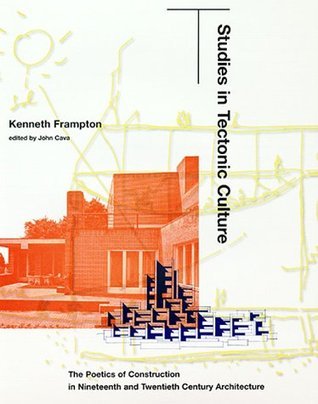
Honorable Mention, 1995, in the category of Excellence in Design and Production, Professional/Scholarly Publishing Annual Awards Competition presented by the Association of American Publishers, Inc. Kenneth Frampton's long-awaited follow-up to his classic A Critical History of Modern Architecture is certain to influence any future debate on the evolution of modern architecture. Studies in Tectonic Culture is nothing less than a rethinking of the entire modern architectural tradition. The notion of tectonics as employed by Frampton—the focus on architecture as a constructional craft—constitutes a direct challenge to current mainstream thinking on the artistic limits of postmodernism, and suggests a convincing alternative. Indeed, Frampton argues, modern architecture is invariably as much about structure and construction as it is about space and abstract form. Composed of ten essays and an epilogue that trace the history of contemporary form as an evolving poetic of structure and construction, the book's analytical framework rests on Frampton's close readings of key French and German, and English sources from the eighteenth century to the present. He clarifies the various turns that structural engineering and tectonic imagination have taken in the work of such architects as Perret, Wright, Kahn, Scarpa, and Mies, and shows how both constructional form and material character were integral to an evolving architectural expression of their work. Frampton also demonstrates that the way in which these elements are articulated from one work to the next provides a basis upon which to evaluate the works as a whole. This is especially evident in his consideration of the work of Perret, Mies, and Kahn and the continuities in their thought and attitudes that linked them to the past. Frampton considers the conscious cultivation of the tectonic tradition in architecture as an essential element in the future development of architectural form, casting a critical new light on the entire issue of modernity and on the place of much work that has passed as "avant-garde." A copublication of the Graham Foundation for Advanced Studies and The MIT Press.
Author

Kenneth Frampton is a British architect, critic, historian and the Ware Professor of Architecture at the Graduate School of Architecture, Planning, and Preservation at Columbia University, New York. Frampton studied architecture at Guildford School of Art and the Architectural Association School of Architecture, London. Subsequently he worked in Israel, with Middlesex County Council and Douglas Stephen and Partners (1961–66), during which time he was also a visiting tutor at the Royal College of Art (1961–64), tutor at the Architectural Association (1961–63) and Technical Editor of the journal Architectural Design (AD) (1962–65). Frampton has also taught at Princeton University (1966–71) and the Bartlett School of Architecture, London, (1980). He has been a member of the faculty at Columbia University since 1972, and that same year he became a fellow of the Institute for Architecture and Urban Studies in New York — (whose members also included Peter Eisenman, Manfredo Tafuri and Rem Koolhaas) — and a co-founding editor of its magazine Oppositions. Frampton is a permanent resident of the USA. Frampton is well known for his writing on twentieth-century architecture. His books include Modern Architecture: A Critical History (1980; revised 1985, 1992 and 2007) and Studies in Tectonic Culture (1995). Frampton achieved great prominence (and influence) in architectural education with his essay "Towards a Critical Regionalism" (1983) — though the term had already been coined by Alexander Tzonis and Liliane Lefaivre. Also, Frampton's essay was included in a book The Anti-Aesthetic. Essays on Postmodern Culture, edited by Hal Foster, though Frampton is critical of postmodernism. Frampton's own position attempts to defend a version of modernism that looks to either critical regionalism or a 'momentary' understanding of the autonomy of architectural practice in terms of its own concerns with form and tectonics which cannot be reduced to economics (whilst conversely retaining a Leftist viewpoint regarding the social responsibility of architecture). In 2002 a collection of Frampton's writings over a period of 35 years was collated and published under the title Labour, Work and Architecture.